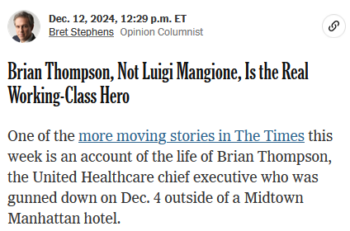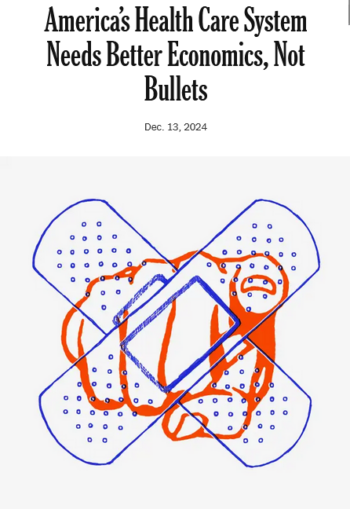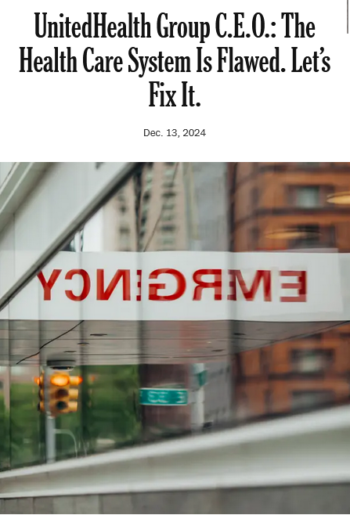In the wake of the killing of UnitedHealthcare CEO Brian Thompson and the arrest of alleged shooter Luigi Mangione, I wrote (FAIR.org, 12/11/24) about how Murdoch outlets like the Wall Street Journal and New York Post, as well as Jeff Bezos’ Washington Post editorial board, not only decried the widespread support for Mangione but fought back against legitimate criticism of the health insurance industry.
Now the New York Times is in full-scale panic mode over the widespread boiling anger against the health insurance industry the killing has laid bare (CNN, 12/6/24; PBS, 12/7/24; Reuters, 12/9/24).
‘Working-class hero’

Bret Stephens (New York Times, 12/12/24): Brian Thompson is “a model for how a talented and determined man from humble roots can still rise to the top of corporate life.”
Times columnist Bret Stephens (12/12/24) wrote that because Thompson came from small-town beginnings, whereas Mangione was from a privileged background, it was in fact the slain CEO who was the real “working-class hero.” This shows that Stephens doesn’t understand class as a relationship of power, where people like Thompson have economic power, regardless of their cultural background.
(As music critic Kurt Gottschalk noted, it also shows that Stephens doesn’t understand the John Lennon song he’s quoting from, whose lyrics advise the would-be working-class hero: “There’s room at the top they are telling you still/But first you must learn how to smile as you kill/If you want to be like the folks on the hill.”)
Stephens said that the idea that health insurance “companies represent a unique evil in American life is divorced from the experience of most of their customers.” The aforementioned FAIR piece contains plenty of evidence that contradicts Stephens’ weak claim that Americans are perfectly fine with the status quo, noting that medical bankruptcies are exploding, that polling shows growing dissatisfaction with the American healthcare system, and that studies show the American system lags behind those of peer nations. But, really, the best evidence that many customers are dissatisfied with the health insurance system is that so many of them found the murder of a health insurance CEO perfectly understandable.
Stephens, one of the Times’ several right-wing columnists, has said (2/28/20) that socialist Vermont Sen. Bernie Sanders, one of the best-known lawmakers supporting Medicare-for-All, “scares” him, because he is “now the old man who rails compulsively against ‘the billionaire class’ and wants to nationalize the health insurance industry.” Stephens (1/31/20) complained that for Sanders’ supporters, “ordinary civility isn’t a virtue,” but rather a “ruse by which those with power manipulate and marginalize those without”; if so, they offer a pretty good critique of the way Stephens himself deploys “civility” to silence dissent.
‘Tiptoe toward justifying assassination’

Ross Douthat (New York Times, 12/13/24) : Criticism of the insurance industry in the wake of Thompson’s murder “illustrates how easily toxic elements can slip into mainstream politics right now.”
Another right-wing Times columnist, Ross Douthat (12/13/24) specifically addressed the “manifestly illiberal conceit that murder is wrong, but public enthusiasm for the murder of an executive in a deplorable industry reflects the understandable anger of people pushed too far”—a position he insisted “seems to tiptoe toward justifying assassination even if you insist that you’re disavowing violence.” He dismissed the “idea that the American model of private insurance is uniquely evil and engaged in acts of social violence because it denies people too much treatment,” maintaining that all insurance systems, public or private, ration care.
But as I noted in the earlier FAIR article, the Commonwealth Fund (NBC, 9/19/24) found that the US system does, in fact, stand out among other peer nations, ranking “as the worst performer among 10 developed nations in critical areas of healthcare.” Those areas the US falls short in include “preventing deaths, access (mainly because of high cost) and guaranteeing quality treatment for everyone.” The rest of the world is doing better than us on these scores, contrary to Douthat.
Americans see the systems working in the rest of the world and know that the United States could have a better healthcare regime, but that corporate and government leaders simply choose not to.
‘We let a murderer manipulate us’
As people shared their health insurance horror stories of denied treatments and mounting bills as ways of understanding the shooter’s outburst, bioethicist Travis Rieder (New York Times, 12/13/24) shook his finger at the masses as if they were rowdy kindergarteners:
The supposed motives assigned to the shooter may well be understandable. But not everything understandable is justifiable. This tragic situation should motivate us to change the institutions and structures that have failed so many people. But not to give murder a pass, and especially not to glorify it.

Peter Coy (New York Times, 12/13/24)suggested that UnitedHealth’s vertical monopolization of healthcare is “something like a private version of a single-payer national healthcare system.”
The paper produced an audio op-ed by political scientist Robert Pape (New York Times, 12/12/24), who urged listeners to see the public reaction as part of “the growing normalization of political violence in America,” rather than as part of the growing outrage over the broken healthcare system in America. Bypassing the latter issue, he simply likened it to the attack against the Pelosis and the two assassination attempts against Donald Trump, incidents that did not spark a national outcry against an unjust policy or system. “It is terribly important right now that national political leaders at all levels condemn political violence and the murder of the healthcare CEO and condemn the outpouring of support for the murder,” Pape said.
Times opinion contributor Peter Coy (12/13/24) investigated the complexities of for-profit healthcare and offered some band-aid solutions, while avoiding any real exploration of a more social democratic approach to healthcare, despite the popularity of publicly financed universal care (Common Dreams, 12/9/24). Coy wrote:
Tragically, Thompson’s shooting wasn’t a solution to anything. “The way we let a murderer manipulate us into having the conversation he wanted is grotesque,” Michael Cannon, the director of health policy studies at the Cato Institute, who favors a free-market approach, told me.
Coy, Pape and Rieder all pay lip service to problems with the healthcare system and suggest changing it through politics—as if people haven’t been fighting for that for decades. They offer the diagnosis that public celebrations over Thompson’s death are the result of some weakness of public character, which means that the answer is reminding people that murder is wrong.
The more honest diagnosis would be that the responses are the result of a broken political system that offers no real way for people to have their healthcare grievances addressed—but that would call not for scolding screwed-over patients, but rather demanding political reform that challenges entrenched political and corporate interests that the Times has little interest in challenging.
‘To help make it work better’

UnitedHealth CEO Andrew Witty (New York Times, 12/13/24) : “We understand and share the desire to build a health care system that works better for everyone. That is the purpose of our organization.” The $23 billion in profits the conglomerate made last year was apparently just a fortuitous happenstance.
But the most banal piece of all came from Andrew Witty (New York Times, 12/13/24), the CEO of UnitedHealth Group—the parent company of Thompson’s division—who said, offering no details and no real agenda for change:
We know the health system does not work as well as it should, and we understand people’s frustrations with it. No one would design a system like the one we have. And no one did. It’s a patchwork built over decades. Our mission is to help make it work better. We are willing to partner with anyone, as we always have—healthcare providers, employers, patients, pharmaceutical companies, governments and others—to find ways to deliver high-quality care and lower costs.
While this piece offered almost nothing other than PR for a company in desperate need for positive spin, its placement on the Times op-ed page did help demonstrate why the shooter got so much sympathy in this case. People like Witty, with access to highly compensated crisis management consultants, can have their polished messaging featured in the highest perches of American media. With all of these pieces on the opinion page lambasting the public for voicing anger against executives like Thompson, there is no voice from anyone on the opinion pages explaining why they are taking part in this national movement of solidarity against insurance profiteering.
That’s a telling omission, because those stories could easily be told, especially as more news about the hideousness of this insurance Goliath emerges. Minnesota doctors have sued UnitedHealthcare, alleging it “deliberately engages in the pattern of ‘deny, delay and underpay,’” resulting in over $900,000 in unpaid independent dispute resolution awards (KMSP, 12/12/24).
ProPublica (12/13/24) investigated how the company is limiting treatment for autistic children. Earlier this year, New York’s attorney general announced that the company was forced to pay “a $1 million penalty for failing to provide birth control coverage, a violation of New York state law” (Gothamist, 6/20/24). Senate Democrats accused the company of “denying claims to a growing number of patients as it tried to leverage artificial intelligence to automate the process,” a kind of capitalist nightmare with a sci-fi twist (Fox Business, 12/6/24).
The cancer patient being denied life-saving treatment, or the mom missing meals and working two jobs to afford their child’s medicine, don’t have PR teams like Witty does to reach the Times. That is why people are expressing such vitriol right now.
ACTION ALERT: You can send a message to the New York Times at letters@nytimes.com. Please remember that respectful communication is the most effective. Feel free to leave a copy of your communication in the comments thread.
This post was originally published on FAIR.